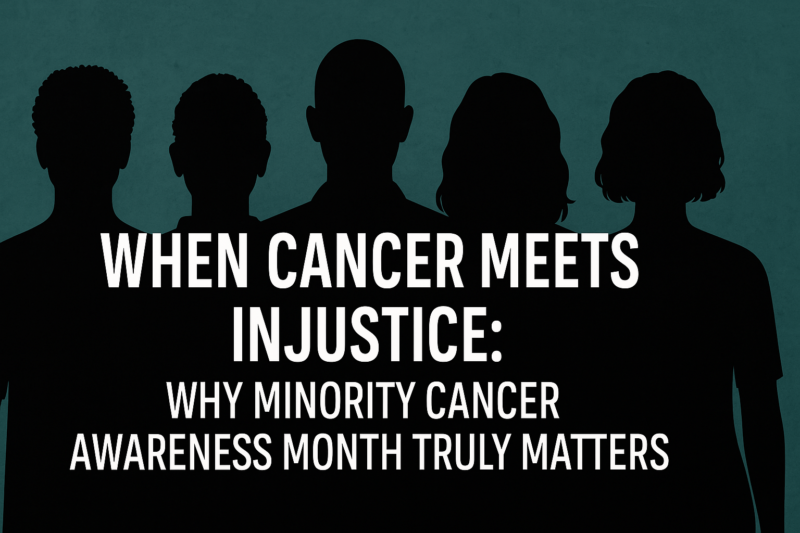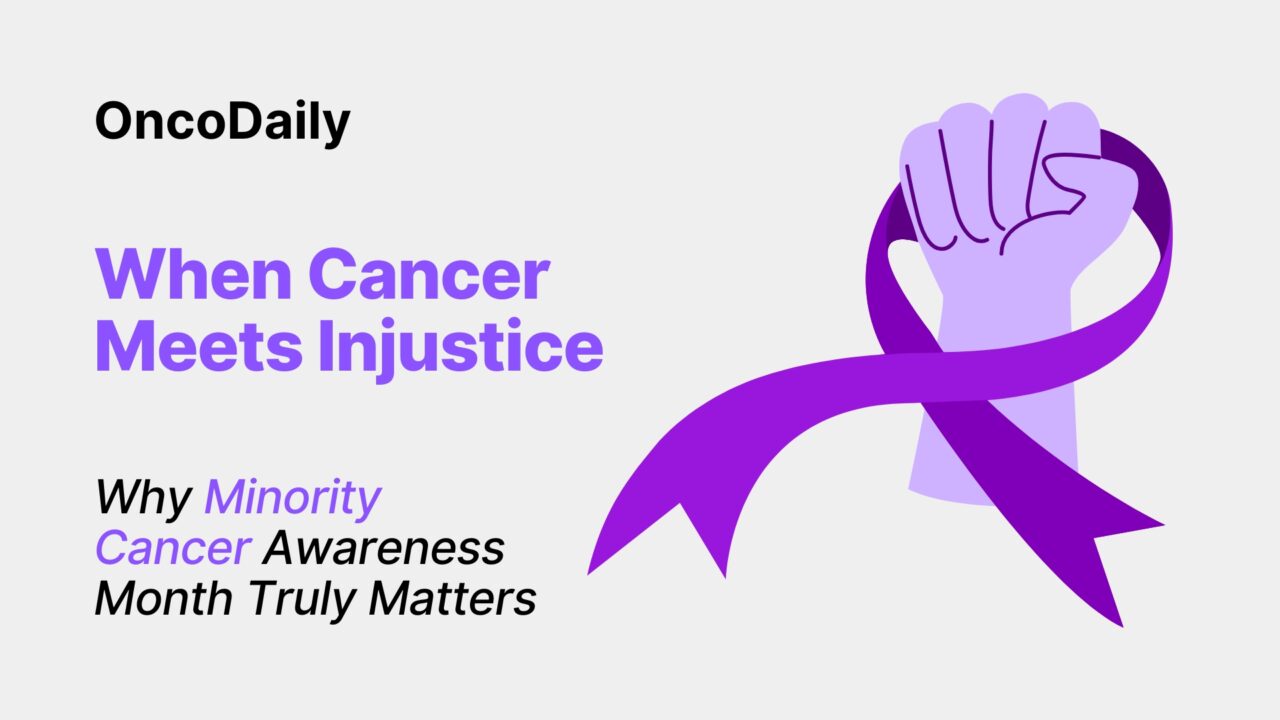Life doesn’t treat everyone the same. And when it comes to cancer, that truth becomes painfully clear.
April is Minority Cancer Awareness Month, a time to recognize the harsh reality that people from minority backgrounds often face a tougher battle—not just against cancer itself, but against the systems meant to protect their health. 
A Harder Fight From the Start
For some, cancer comes with access to early detection, cutting-edge treatment, and a team of specialists. For others, it comes with delayed diagnoses, limited options, and barriers that go far beyond biology.
Take cervical cancer. It’s preventable and treatable—when caught early. Yet Hispanic, Black, American Indian, and Alaska Native women are more likely to get it and more likely to die from it than their white counterparts. For Black women in particular, the death rate is the highest among all groups.(American Cancer Society, 2022)
But it’s not just about cervical cancer. Disparities stretch across the cancer spectrum, and nowhere is it more visible than in multiple myeloma, a type of blood cancer.
The Reality of Disparity in Multiple Myeloma
For over 35 years, the International Myeloma Foundation (IMF) has supported patients battling multiple myeloma all over the world. But as the organization has acknowledged, not all patients have received the same care—or outcomes.
“There are tremendous health disparities in multiple myeloma,” notes the IMF, “particularly in the African-American and Latino-American communities.” These patients often face delayed diagnoses and reduced access to care, both of which lead to worse survival rates and fewer treatment opportunities.
It’s not just a medical problem—it’s a societal one. And it’s deeply rooted in systemic inequities that can no longer be ignored.
Hope Through Empowerment
Thankfully, the tide is starting to turn—at least for some. Programs like the IMF’s Empower initiative are working to change that trajectory by focusing on education, awareness, and equitable care for African-American patients and other historically underrepresented groups.
Through community outreach, culturally appropriate education, and partnerships with local organizations, Empower is helping more people get diagnosed earlier, access newer therapies, and ultimately live longer, healthier lives.
“There is evidence that things are starting to get better,” says the IMF. “Of course, not for everyone, but for many people.”
That progress is encouraging—but we have a long way to go.
As the International Myeloma Foundation (IMF) shared in a recent post, “April is Minority Cancer Awareness Month. We raise awareness about the disproportionate impact of cancer on minority populations, promoting early detection, prevention, and access to healthcare.”
Health Is More Than Medicine
It’s not just the biology of cancer that causes these disparities—it’s where people live, how much they earn, whether they’re insured, and how the healthcare system treats them.
These social drivers of health hit minority communities the hardest. And they’re part of why people of color are more likely to be diagnosed at a later stage, receive inadequate treatment, and experience worse outcomes.(National Cancer Institute, 2022)
Knowledge Is a Lifeline
When people are empowered with information—about symptoms, screenings, or treatment options—they’re better able to advocate for themselves. That’s why health literacy matters.
From barbershop-based health discussions to Spanish-language cancer resources, communities are finding creative ways to bring knowledge to where people already are. Even federal and state programs are beginning to realize that plain, accessible communication isn’t a luxury—it’s a necessity.
What Needs to Change
While community-based action is key, we also need lasting change at the policy and institutional level:
-
Train doctors in cultural humility, not just cultural competence.
-
Diversify the healthcare workforce so patients can see themselves reflected in their providers.
-
Invest in organizations like the IMF that are committed to closing these gaps.
-
Support policies that make early detection, screening, and treatment available to all, not just those with privilege.
As the American Medical Association and others have emphasized, healthcare equity isn’t a side issue—it’s central to improving outcomes for everyone.⁴
Beyond the Diagnosis: Culture and Care
In many communities, cancer is still a taboo topic. It’s seen as a punishment, or something not talked about out loud. That stigma can delay care, and worsen outcomes.
Understanding a patient’s cultural background—what they believe, how they process illness, who they trust—is essential. Cancer care must be personalized not only to the biology of the disease, but to the humanity of the person.
Looking Forward: A Call to Action
Minority Cancer Awareness Month is about more than raising awareness—it’s about demanding action.
It’s about making sure that every patient, no matter their race, ethnicity, or income, has a fair shot at surviving cancer.
And it starts with us.
What You Can Do:
-
Advocate for clear and inclusive healthcare communication.
-
Support organizations working to eliminate disparities in cancer care.
-
Keep having conversations—at work, at home, in your communities.
Because while cancer may not discriminate biologically, the system often does.
And that’s what we have the power to change.
Stay tuned for the latest updates from International Myeloma Foundation (IMF) on OncoDaily.com
by :- Md Foorquan Hashmi, MD, Sr. Editor, OncoDaily: India Bueura


